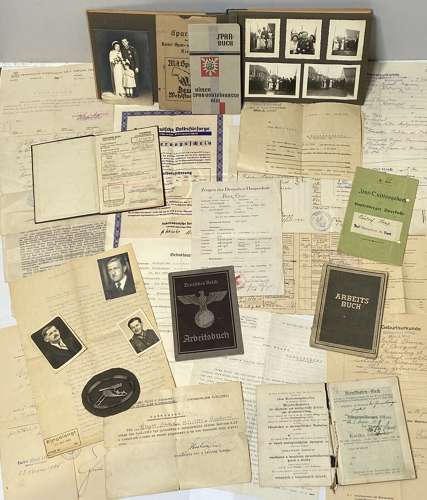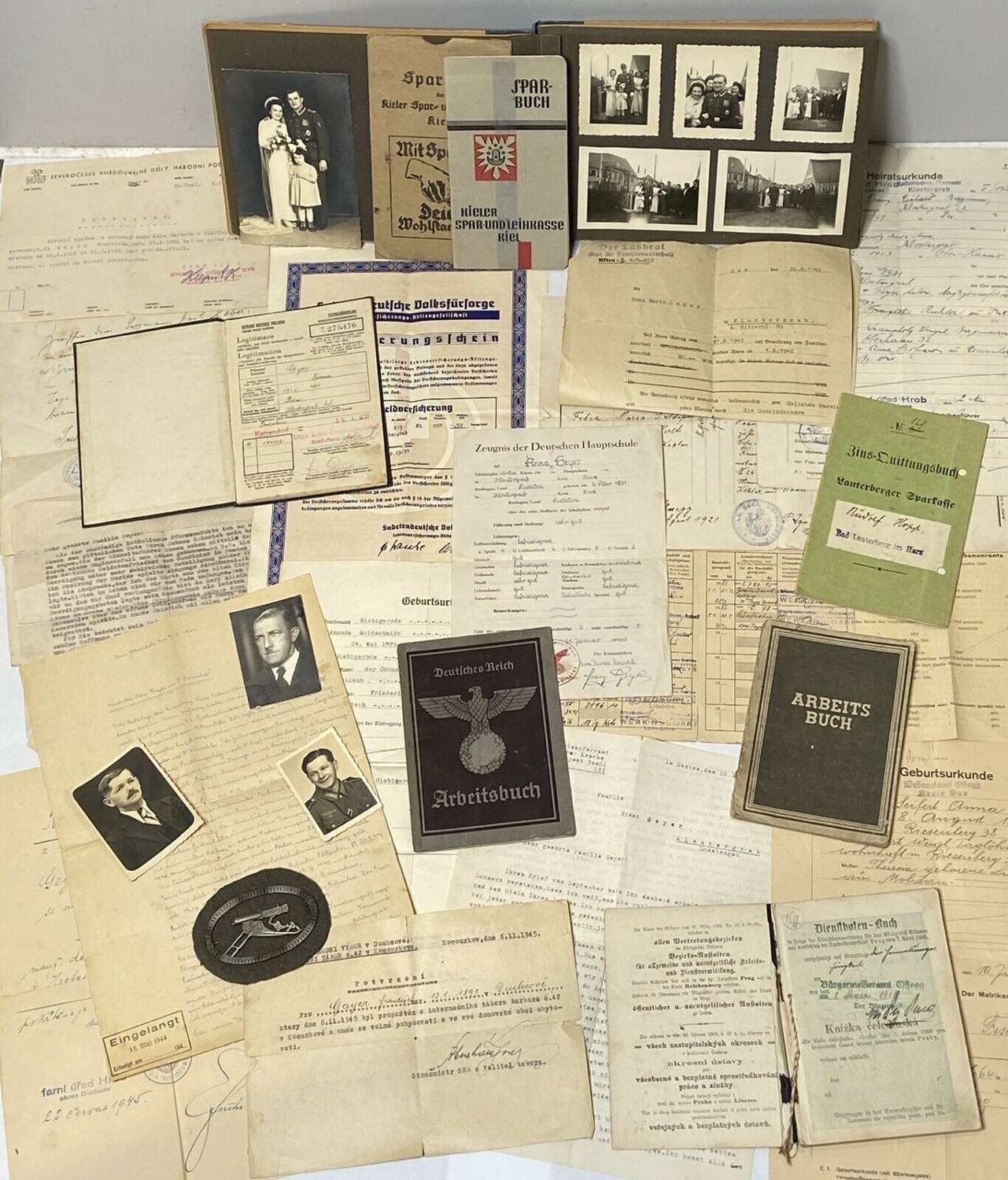
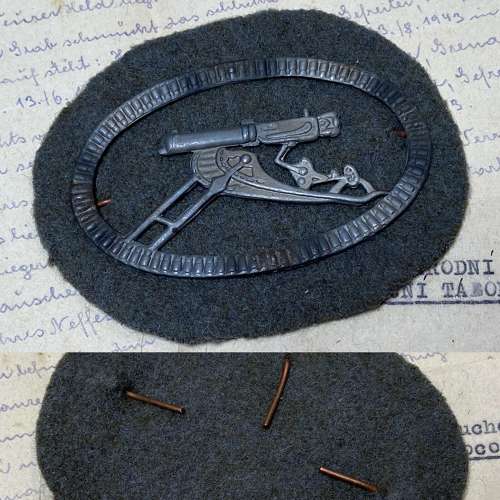
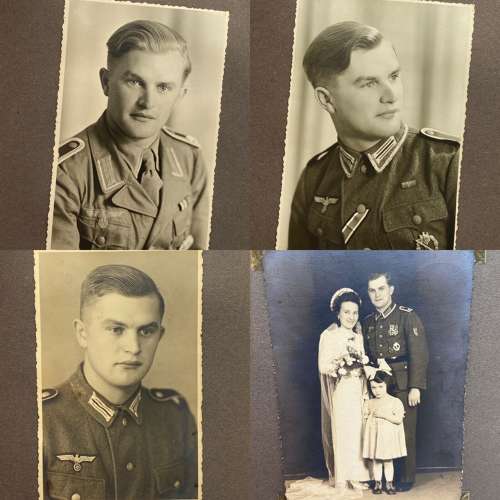
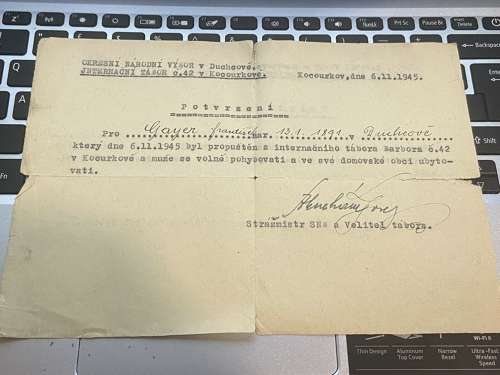
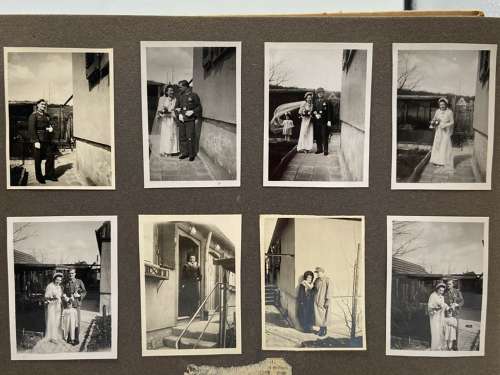
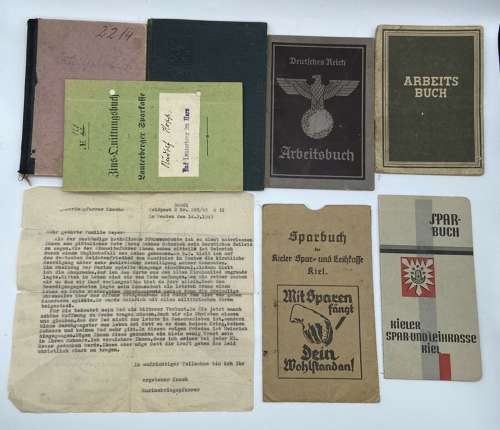


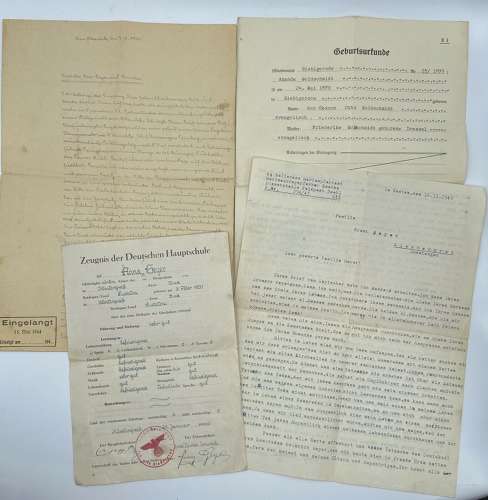

WW1 & WW2 German Military Group To Geyer Family Machinegun Badge etc
Code: 11213
WW1 & WW2 German Military History Group To Geyer Family Machinegun Qualification Badge, Kriegsmarine, Afrika Korps & Internment Camps
This is a brilliant ww1 and ww2 German military grouping belonging to a Czechoslovakian family called the Geyer’s. This paperwork grouping belongs to two sons, a wife and a father.
The farther Franz Yeper born 13th January 1891, born of the German Reich. He was a ww1 veteran, enlisting on the 22nd June 1915 to the end of the war in 1919 to a machine gun company, his German Machinegun Qualification Insignia badge is included in this set. Both before the war, in between wars and after the war he worked as a miner. The two sons and the farther are from District in the Ústí nad Labem Region of the Czech Republic. Franz Geyer was married and had two sons;
The first son enlisted to the German army in 1938, fighting in the afrika korps also wounded here (there is s brilliant portrait photograph of him in his uniform in his wedding photograph album at the back), he escaped Africa and thought at the battle of Stalingrad and many other important battles, in his photos you can see that he has been awarded the following: black wound badge, iron cross, Stalingrad medal, Crimea shield award, assault award and at the rank of Oberfeldwebel. This young man survived the war and was highly decorated this can be seen in the photographs. However his brother Heinrich Geyer joined the Kriegsmarine, (who can also be seen in the photograph album in his uniform) was sadly killed on the 9th of September 1943 Heinrich was buried at the German military cemetery of Gaudinier in Nantes, in which a German navy band played music at the entrance. His comrades laid a wreath and he was buried with full military honours, there are three letters in this grouping referring to his death and funeral two letters (typed) from the company chaplin and the other is from his friend Schitter who describes how he died, the details and how much he will be missed. One of these letters is typed up for you at the end of this letter.
After ww2 Frautisch Geyer and Franz Geyer, were taken as Rusisan/ Czechoslovakian prisoners of war and forced into Czechoslovakian Barbora e42 internment camp in kocurkova, these camps were similar to the concentration camps set up in Germany, where the work forced were worked to death, about 75 000 people passed through the camps in the Jáchymov area, of whom 45 000 - 50 000 were actually political prisoners," said František Šedivý, vice-chair of the Confederation of Political Prisoners (Konfederace politických vězňu
- KPV). A commemorative mass and subsequent speeches were attended by not quite 100 people. Of the political prisoners from the 1950s who were persecuted and underwent imprisonment and the camps, 1 200 - 1 400 are still alive, and the entire KPV has 2 800 members, including family members of political prisoners. As many as 100 000 prisoners out of a total of 200 000 convicted persons passed through forced labor camps on the territory of the former Czechoslovakia in the postwar era. Many of them died of lung cancer as a result of the inhumane conditions in the camps, while others were shot dead as they tried to escape. It is not a problem to approximately locate all 18 of the prison camps that were established in Czechoslovakia between 1949 and 1953, even though they were all subsequently destroyed without a trace. Some of the camps were named after nearby municipalities (in the Jáchymov district there were the camps Mariánská, Vykmanov I and Vykmanov II, in the Horní Slavkov area the camp was Ležnice, and in the Příbram district the camp was called Bytíz), but they were most often named after the adjacent mines. The communists very quickly filled these camps with prisoners who were forced to perform demanding and exhausting work underground without any protective equipment. As if that were not enough, inhumane conditions in the camps once work was over were no exception. The prisoners themselves were convinced by their captors that they were merely "dead men walking". When I saw the camp it reminded me of the German concentration camps I had seen in films and photographs. There was a wide platform area, wooden huts, multiple layers of fencing, and sniper zones. However, it wasn't exactly the same - there was no crematorium chimney, and the sign over the gate didn't read 'Arbiet macht frei', but had a nice version of our own up there: 'Work for freedom'," recalls former prisoner Oldřich Klobasa on the website "The Hell of Jáchymov" (Jáchymovské peklo), which is designed to accompany the hiking trail now in place at the site.
Items included in this lot:
1. 1 wedding Photograph album containing 32 photographs, with virtually all of them containing soldiers, Wehrmacht, Afrika corps and Krieg marine.
2. German Reich Arrbeitsbuch workbook belonging to farther. Franz Yeper born 13th January 1891, born of the German Reich. He was a ww1 veteran, signed up on 22nd June 1915 to the end of the war in 1919 to a machine gun company, his German Machinegun Qualification Insignia badge is included in this set. Early 1950s he was forced into labor camps, forced into coal mines, as a political prisoner via Russia VEB Braunkohlenwerk Nachterstedt, more documents like this throughout.
3. A WW1 German Machinegun Qualification Insignia badge, missing the back plate, however wool is present. Maschinengewehr Abzeichen Hand-picked German soldiers were formed into elite machine gun units that were trained in precision firing of the heavy guns from strategic battlefield locations. Members of the MG-Scharfschuetzen (machine gun sharpshooters) who mastered these techniques were awarded a proficiency badge, first authorized in January 1916.
4. Polish ausweiss holder with german insurance for miners to Franz Yeyer. Franz was born in Hrob (German: Klostergrab) is a town in the Teplice District in the Ústí nad Labem Region of the Czech Republic. It has a population of around 2,000. This ID protects the interests of the Vado and Vadi families.
5. Wehrpass photograph for the farther
6. Small portrait identity photograph of one of the brothers in infantry Wehrmacht uniform wearing iron cross ribbon.
7. ID Photograph for a Doctor Laylib, dated 14.7.1943 counterstampted by the local police.
8. Kiel Savings and Loan Fund and carry purse dated 1931
9. Social insurance NVA 1952 Franz Geyer.
10. Franz Geyer 1919 date mining work book for Dr Rudolf Alberti Bad lauterberg.
11. Birth certificate ΕΙ (civil registry office Siebigerode Amanda Goldschmidt -. *. Rr. 25/1879) Pn. iſt on May 24, 1879 in Siebigerode Bater: the economist Otto Goldschmidt 2.- .- born. Protestant mother: Friederike Golschmidt née Dressel Ess === Protestant changes to the entry: Siebigerode December 14, 1939.
12. A letter from a catholic priest to Franz geyer dated 18.11.1943, where the priest talks about Franz geyers son who has died at war in a far of land away from parents and relatives. His name is Heinrich Geyer
13. (SCHOOL REPORT) A certificate from a german secondary school for Anna GEYER, DATED 3RD FEBRUARY 1931.
14. Confirmation of employment of frankrisek Geyer are barbora mine in oldrichov, proof of employment from 22.6.1915 to 15.5.1946
15. Another field post letter from the unit navy Chaplin to franz geyer (farther) dated 14.9.1943 informing him of his son heinrich geyer, on 9.9.1943 heinrich was buried at the german military cemetery of gaudinier in nantes, in which a gemran navy band played music at the entrance. His comrades laid a wreath and he was buried with full military honors.
16. Baptism and birth certificate for Orna Seifert 10th January 1942
17. Birth and baptisem certificates for 1903 and 1915 maria and anna
18. District administration department for family maintance letter 26th august 1942
19. F1 marriage certificate for the man in the photograph album and his wife. Within the Geyer family
20. 1939 life insurance for marie klostergrab geyer
21. Frautisch gayer, Czechoslovakian barbora e42 internment camp in kocurkova release form for 6.11.1945 granting free movement in home town. With the original hand signed signature of the strazmistr snb a commander.
22. Family health department insurance 1955
23. Temporary personal auswiess ID 25.3.49
24. HANDWRITTEN LETTER DATED 1944 talks about how heinrich geyer died, from his friend, and talks about his time during the war
25. March 29th 1903 word book bohemia district to maria
26. Arbeitsbuch NVA 1955 INTERNMENT CAMP ENTRIES IN COAL MINES
Letter translated from czeckoslavakian to English, letter is of releasement from an internment camp:
DISTRICT NATIONAL COMMITTEE IN Duchcov INTERNATIONAL CAMP C.42 in Kogourkov. Kocourkov, on November 6, 1945. Confirmation ==== ===== = == ==== Goyer fautisfur. 12.1. A891 y Duehcove who was released on November 6, 1945 from the internment camp Barbora No. 42 in Kocurková and can move freely and stay in his home village- Pro .... ...... vati. Mushirm, me Warden SN and Commander / Camp.
One of the letters from the chaplin
“Dear gyger family! I received your letter from September with thanks. i can understand your pain. because i know what you have forgotten: the love of your heart and the stilt of your life. I assure you once again that I will surrender your longing to everyone. measure will remember. The two St. measure that you sent me are in my possession. I will be able to celebrate them very soon. Thank you so much! Then they asked me to send you the address that was given to the comrades at the grave of your boy. Now as well as I remember what you said, I am happy to follow your wishes. In the middle of life we are surrounded by death. Whom are we looking for as a savior to gain grace? That's you, Lord alone! comrades with these values an old hymn begins in our german homeland. It has been sung for centuries. It tells us a fact that is true about the differences of opinion among people who themselves are unbelievable and still have to believe: the fact of death that goes with every human being, we have our own shadow. and as one cannot get rid of one's own shadow, so one cannot escape the skitter death either everybody knows us women in his or her life or in the life of a comrade about events that he has to say to himself or a comrade: at that moment my life hung by a thread yes, if we were blob thoughtful we had to tell ourselves that the schitter death can cut and cut this silk thread of life at any moment. Better than anywords, this fact reveals the fate of our comrade Heinrich Geyer, whom we have to bed here in a strange earth today, far from home and his parents and relatives. You all know this as his comrades his fate. He was a sailor in body and soul. He was your comrade who carried the joys and sorrows of the slow sea voyage and the hard struggle with you, who has been on enemy voyages with you so often now death suddenly and unexpectedly took hold of the helm of his life and deer. Schnitter commanded: stop stop! When his comrades were his destiny. He was seemann with body and soul. He was your comrade who bore you the joys and sorrows of the deep seafaring and the hard struggle. who so often went on patrols with you. Now, suddenly and unexpectedly, Ted grabbed the rudder of his life and the reaper prayed: stop + stop! In view of this fate, the question arises of its own accord: Whom, as Retti, do we seek that we may obtain grace? Our fathers only knew one answer to this question: You are Lord alone.! In the threat of death of your time and your livers, you still believed that the grave is not the last thing in human life, that people: do not live and process ended up in the grave. No they looked naked to the one who was great in life but who is greatest in dying: after Jesus Christ. And they and all great people of our Velkes have learned that it is the highest earthly wisdom his life to place in the hands of someone higher than you when you die, like the Lord did on the cross: Father in your hands I commend my spirit. Canerades not everyone can speak these values. It seems like great faith is part of it and it needs to be practiced to see the hand of God even in the open grave, or in far-reaching seas. And yet such a belief is possible, even in the first world war He let our seaman poet Gerch Fook write to his once you hear that our ship has given up, dznn w @ ime not! Because also the sea into which my body sinks, is nothing more than the hollow hand of my Savior, who can snatch nothing from me. "And this belief also lets us speak to the grave of our comrade Geyer: Comrade, the earth that is opening up to be a crab for you, is not an abyss without concern, but is always the hand of God, into which your praise is now poured. And in his hand we will lggon that which is immortal in you, you good camera d + We also lay our fate in his hand That is still our best strength, if we can say to ourselves as Seldaton: Our fate is in Gette's hands. And in this consciousness that we take away from our unfortunate comrade. We are now going to sell one to our servants again stay: The memory of our comrade and oas vow to do it right away en Ted.Agen. an reue That was at least the content of my speech. Whether I was giving it, I can no longer bless it .'''----- On a fine day I will snap the "rabbit of your heart". You will receive it a little souvenir. HD Greetings from your furd, Iuuce Warine War Parish *mother for a few months, in Starcrnarschlackt, on May 7th, 1910: Mother, when Thin. “
More information on the czeckoslavakian work camps can be found here: http://www.politicalprisoners.eu/prisons-and-working-camps-in-czechoslovakia.html?fbclid=IwAR3lQvkmFDPRaTDheKRvBrE64gO0O5jTjZM9KJcOKWfwrprb5L-ByHxA0vc
This lot is a truly fantastic grouping with huge amounts of history, all from WW1 TO WW2 And then to the atrocities committed by the Russians and Czechoslovakians at the end of the war. This lot has plenty of research still to be done! This will be sent via special delivery and dispatched within 2-3 working days.
